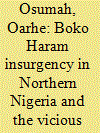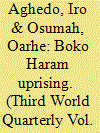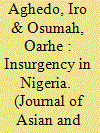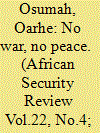|
|
|
Sort Order |
|
|
|
Items / Page
|
|
|
|
|
|
|
| Srl | Item |
| 1 |
ID:
122224


|
|
|
|
|
| Publication |
2013.
|
| Summary/Abstract |
The phenomenon of the Boko Haram insurgency in Northern Nigeria has generated many security concerns. This article explores the implications of the Boko Haram insurgency in Northern Nigeria for internal security. The article, which relies on a study of secondary sources of data, reveals that the insurgency has spawned varied implications such as an international image crisis, huge economic losses, a health and humanitarian crisis, a huge burden on the security apparatuses, arms proliferation, and endangered national unity. It holds that the insurgency is essentially interlinked with a breakdown of the social contract manifested in opportunistic behavior, economic stagnation, and lack of functioning institutional mechanisms for policy conduct and conflict resolution. Owing to the security menace posed by the insurgency, the article recommends that the root causes of the insurgency should be tackled rather than relying on reactive measures that cannot guarantee enduring peace and internal security.
|
|
|
|
|
|
|
|
|
|
|
|
|
|
|
|
| 2 |
ID:
113358


|
|
|
|
|
| Publication |
2012.
|
| Summary/Abstract |
Since the execution of Osama bin Laden and a few other al-Qaeda kingpins, the incidence of international terrorism seems to be on the decline and the 'war on terror' has been applauded as a huge success, with some even arguing that terrorism will fizzle out sooner rather than later. But recent experiences in Nigeria and some other African states reveal that, while global terrorism may be on the decline, the proliferation and radicalisation of local terrorist groups with possible links to al-Qaeda seem to be on the rise. The quest for effective counter-terrorism therefore continues. This article interrogates how Nigeria should respond to the Boko Haram terrorist uprising. Methodologically it relies on both primary and secondary sources of data. It provides an overview of the evolution and dynamics of the uprising in Nigeria, and explores the motivations, strategic operations and responses of Boko Haram. The article shows that the uprising, which engenders general insecurity, is a consequence of governance failure and institutional fragility. Thus, it concludes that, to effectively address the uprising, Nigeria should adopt a human security approach rather than the current emphasis on a repressive state security approach.
|
|
|
|
|
|
|
|
|
|
|
|
|
|
|
|
| 3 |
ID:
138122


|
|
|
|
|
| Summary/Abstract |
The Niger Delta militancy and Boko Haram insurgency pose the greatest security threat to Nigeria since the end of the civil war in 1970. This article places both rebellions in comparative perspective. It argues that, though spatially and ideologically differentiated, both insurgencies are products of the dysfunctional character of the Nigerian state. Owing to poor governance, the state relies essentially on repression and the military option in managing challenges to its legitimacy, leading to the radicalization of violent non-state actors. The article recommends the need for developmental politics and a critical re-examination of the National Question to make the state more relevant to the people.
|
|
|
|
|
|
|
|
|
|
|
|
|
|
|
|
| 4 |
ID:
124490


|
|
|
|
|
| Publication |
2013.
|
| Summary/Abstract |
The armed conflict over crude petroleum oil in the Niger Delta has raged for several decades. A host of peace initiatives have been adopted by the Nigerian state to address it, but with minimal impact. The amnesty offer to repentant militias in 2009 by President Umaru Yar'Adua's administration is one of the most recent and broadest peace initiatives by the Nigerian government intended to end the general tendency to warfare and the absence of peace in the Niger Delta. This article, based on secondary sources of data, examines the components of the amnesty, its critical problems and their implications for peacebuilding in the Niger Delta. It finds that though the programme has engendered relative peace, the issues and grievances that occasioned the general tendency to warfare and absence of peace in the region - such as inequitable distribution of oil revenue, environmental degradation, and underdevelopment - are not properly articulated in the disarmament, demobilisation, and reintegration components of the programme. Thus, it holds that the prevailing situation in the region largely approximates a swinging pendulum of no war, no peace.
|
|
|
|
|
|
|
|
|
|
|
|
|
|
|
|
|
|
|
|
|